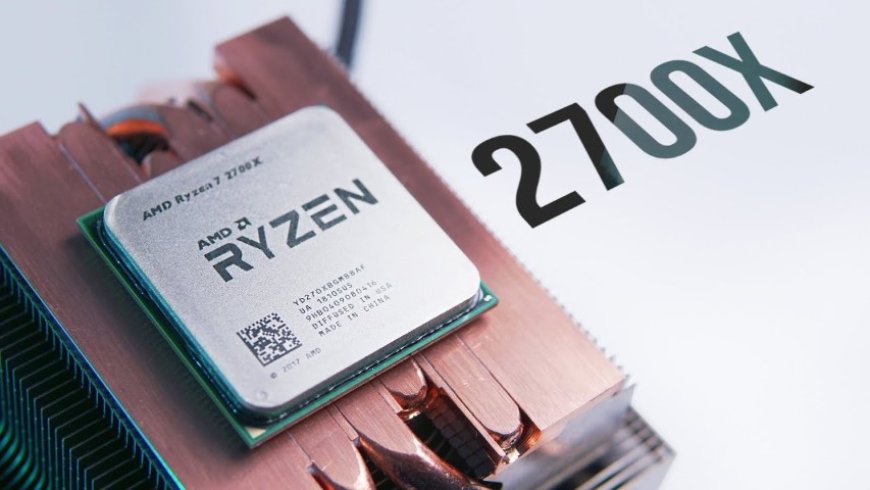Ryzen 2700X in 2024, Still Worth to Buy?
If you're building a gaming PC on a budget, it's likely that a significant portion of your funds will be dedicated to a powerful graphics card. This often leaves a limited budget for the processor, presenting you with a few choices. You can opt for a newer, budget-friendly CPU like the Ryzen 4100, or consider an older, but still capable 8-core processor such as the Ryzen 2700X. In 2024, the Ryzen 2700X remains a solid option for single-player games, capable of delivering around 60 FPS. However, how does it fare in fast-paced multiplayer shooters where speed and response times are critical? That's what we're here to explore.

We tested the Ryzen 2700X on an X570 rig, paired with an RTX 3060 12GB graphics card. Although the 2700X only supports PCIe 3.0, the 16x lanes of the RTX 3060 help mitigate bandwidth limitations. All benchmarks were recorded using an external PC to ensure no performance loss. For new viewers, our focus is on system response, particularly frame times during intense action scenes. This is a real-time measurement of smoothness and stuttering in-game. The more consistent the frame time, the smoother the experience.
Let's start with our first game, Warzone, on the map Ozikan. Warzone utilizes multiple threads, and while the 2700X has weaker single-core performance compared to modern processors, its 16 threads help in this DirectX 12 game. The 2700X manages to hit around 90 FPS, though frame times are somewhat erratic, leading to a less smooth experience. You can still play the game, but expect some disadvantages. Despite the inconsistencies, it performs better than the Ryzen 4100, which we found unplayable a few months back.
Next, we tested Helldivers 2 at medium settings, 1080p native. Comparing medium settings to ultra-quality upscaling, the latter shows some advantages, but only in limited action areas. In real-world scenarios, such as during a Terminator swarm, the CPU load causes FPS to hover around 60, with noticeable stutter. While playable, the delay and stutter are evident, though less critical in a PvE game compared to competitive shooters.
Fortnite, another popular game, now runs on Unreal Engine 5. Many underestimate its demand on hardware, thinking 144 FPS is sufficient. However, for intense build fights, higher FPS is necessary. Testing across DirectX 11, DirectX 12, and performance mode, the latter proved best for the 2700X, compensating for its weaker single-core performance. Although the RTX 3060 isn't fully utilized, FPS often drops below 200, with erratic frame times impacting gameplay. For serious competitive play, a better processor is recommended.
In Valorant, we used competitive settings at 1080p. Here, the 2700X's limitations are evident, with around 200 FPS. Micro-stutters are frequent, particularly during effects-heavy scenes, impacting the overall experience. This issue persists throughout the game, especially in early rounds.
PUBG, tested with the DirectX 11 enhanced API, adds substantial load to the GPU. Despite this, the 2700X manages decent frame rates around 150 FPS. While stutters are present, they are less severe compared to Fortnite. Given PUBG's slower pace, the 2700X provides an acceptable experience.
Apex Legends, a fast-paced shooter, has a maximum FPS of 300. The 2700X struggles to hit this, limited by its single-core performance. Nonetheless, it achieves around 150 FPS, with good stability and minimal stuttering during critical moments. Apex Legends' optimization allows the 2700X to perform admirably.
Comparing the Ryzen 7 2700X to the Ryzen 3 4100, both are similarly priced but offer different strengths. The 2700X's eight weaker cores contrast with the 4100's four stronger cores. In Valorant, the 2700X outperforms the 4100 in action-heavy scenarios. In PUBG, both CPUs are closely matched, though the 4100 slightly outperforms in some benchmarks. Helldivers 2 shows similar performance for both, with the 2700X's extra threads providing slight advantages in multi-threaded tasks.
Ryzen 7 2700X remains a viable option in 2024, especially for budget-conscious gamers. Its eight cores are beneficial for tasks beyond gaming, offering more versatility than the Ryzen 4100. At around $61, it provides excellent value, with an obvious upgrade path to more powerful CPUs like the Ryzen 5700X3D or 5800X3D. While not without its limitations, the 2700X is a solid choice for those balancing performance and budget.







